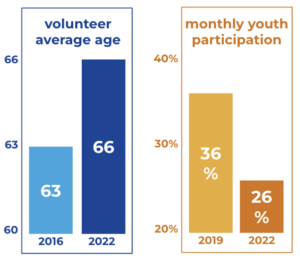Re-engaging America in Civic Society: Part I
A Map of Where We Are Right now
America is set apart in many ways. One key aspect that makes this country unique is the role of the civic society. A civic society is a voluntary body that aims to represent the needs of a local community. Parent-teacher associations, youth sports leagues, and places of worship are but a few examples.
Civic society is important because, per George Ingrams of Brookings Institution, “they monitor government policies and actions and hold [the] government accountable. They engage in advocacy and offer alternative policies for government, the private sector, and other institutions. They deliver services, especially to the poor and underserved. They defend citizen rights and work to change and uphold social norms and behaviors.”
And most importantly, civic society brings people out of their social bubbles into a common flat setting, creating interpersonal interactions to build a stronger social fabric.

Donor Engagement Statistics
Here is the rub: Civic society appears to be withering on the vine. Per Blackbaud Institute, the average age for volunteers rose from 63 to 66 in the six years spanning 2016 until 2022. Commensurately, Lifeway Research shows that the percentage of youth attending service dropped from 36% to 26% in the three years spanning 2019 and 2022. While it is reasonable to partially attribute this atrophy to the COVID-19 pandemic, we must also acknowledge that the crowded field of products for the “attention economy,” namely social media, clickbaits, and the various constantly-buzzing gadgets play an important part.
We are a polarized society stuck in ever-smaller bubbles. We mistrust, if not vilify, others with differing political views, faiths, or socioeconomic backgrounds. Whereas we used to engage with our counterparts in physical social settings that forced us out of our hermetic bubbles, we now “choose” to live in comfortable cocoons, assuaged and pacified by our smartphone apps.
Civic society is not standing still. It is struggling, but it is swimming against the tide.

